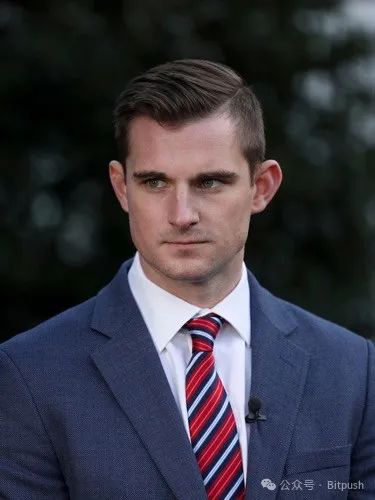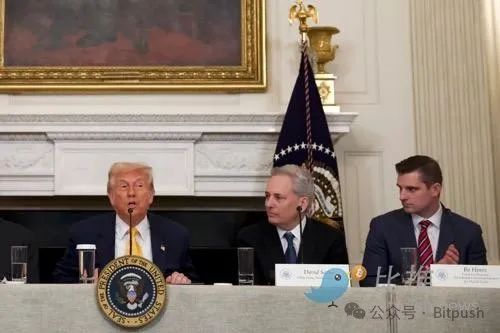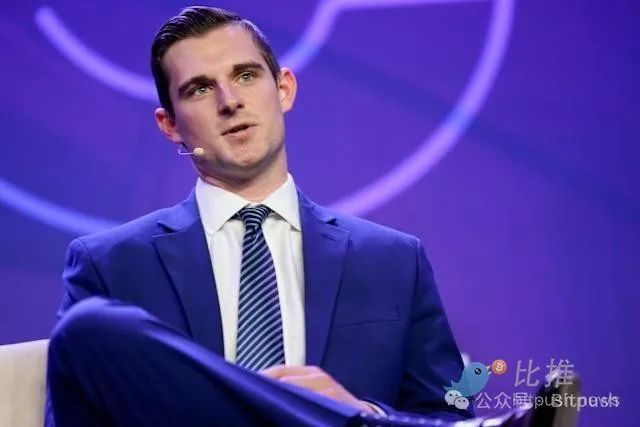From footballers to "crypto military advisors", how did the 29-year-old Bo Hines "counterattack" the White House?

Reprinted from panewslab
04/15/2025·8D
When Donald Trump held his first cryptocurrency summit in March this year, he sat around him with several of the highest-level advisers. On his right was Treasury Secretary Scott Bessent, and on the left was cryptocurrency and artificial intelligence affairs director David Sacks, venture capital giant. Next to Saxophone is a person who was completely unfamiliar to everyone in the venue a few months ago: 29-year-old former congressional candidate and college football wide receiver Bo Hines.
Bo Hines, who has assisted the Trump campaign’s top super political action committee with advertising, has appointed Hines to lead a radical plan to develop crypto-friendly regulatory policies and overturn the Biden administration’s crackdown on the industry.

U.S. President Trump and David Sacks (Central) and Bo Hines at the White House Digital Assets Summit on March 7, 2025
From an unknown person to a popular person
In his first 30 days as executive director of the President's Digital Assets Advisory Board, Bo Hines has become a cryptocurrency celebrity—a number of CEOs and billionaire investors scramble to book his time, while lobbyists rush to talk to him face to face.
Bo Hines schedule obtained by Fortune magazine through the Freedom of Information Act shows that during his first 30 days in the position, he met with more than 50 cryptocurrency lobbyists, investors, company founders, institutional officials and bankers.
He met with Chris Dixon and Marc Andreessen of Andreessen Horowitz, the top investment in Silicon Valley, Brad Garlinghouse, Ripple CEO, and Caroline Butler, head of digital assets at Bank of New York Mellon.
Some of these meetings were held at the White House, others at cafes, Zoom video conferences, or the Old Ebbitt Grill, the oldest catering salon in Washington.
"I want to meet everyone in this field - big players, small players," Hines said in a recent interview with Fortune at Tatte, an Israeli-American-style cafe near the White House. "I want to hear everyone's ideas."
Although David Sacks has decades of business experience and a higher position with his early years of experience at PayPal and Craft Ventures, the unknown Hines undertakes more daily affairs due to his part-time government employee (limited to 130 days a year), and a spokesman for the U.S. Office of Science and Technology Policy (OSTP) insists that the two are "working side by side."
At the desk on the fourth floor of the Eisenhower Executive Office Building, Hines has become one of the most influential figures in the crypto world. He is actually the main liaison between the White House and the cryptocurrency industry, committed to turning industry dissatisfaction into specific policies.
Hines faces more challenges as Trump's tariff offensive stirs global markets and leads to violent fluctuations in digital asset prices. Trump's capricious economic policies have caused the stock prices of blockchain-related companies to plummet, and the potential economic crisis could further suppress crypto markets increasingly linked to traditional stock markets. In short, Trump's intermittent tariff war may reverse the economic progress of the blockchain industry in recent years.
To understand what happened in the first few months of Trump’s cryptocurrency agenda and the people who tried to implement it, Fortune interviewed the young man and interviewed more than a dozen people who had met or spoke to him since January. Most people requested anonymity because the conversation involved privacy.
They commented that Hines lacked crypto experience but learned quickly and was eager to understand the rebel industry seeking legalization, even if it was trapped in factional struggles. "He's like drinking water at a fire hose," said a cryptocurrency executive and Washington insider. "For anyone in the cryptocurrency space, he's the industry's number one entry point for the White House."
Encryption – From the edge to the center
When Hines' spokesman suggested meeting in Tatte near the White House, he went to the wrong two branches due to delays in the previous session. When he finally arrived at the third Tatte of the day (wearing a dark grey suit and smiling), he immediately cut into the cryptocurrency topic.
Hines, with a clean face and neat hairstyle, has a capable temperament that he has honed with two North Carolina congressional campaigns (both failed in 2022 and 2024). He spoke quickly and answered decisively, repeatedly praised Trump, insisting that encrypting supervision should become a consensus between the two parties. Obviously, the 29-year-old is reluctant to be regarded as a political rookie, but rather wants to be seen as a Trump ally who can do practical things.

" We respect the President, appreciate his work, and respect his 'America First' position—the crypto space is no exception."
The crypto industry, once dominated by outsiders and government skeptics, has moved closer to Washington politicians in recent years. FTX founder Sam Bankman-Fried has spent tens of millions of dollars to support pro-blockchain politicians in an attempt to push for comprehensive regulatory legislation. But as its exchange burst, the Biden administration launched a law enforcement action, prosecuting leading companies such as Coinbase (SEC accused it of not registering in compliance).
Led by industry giants such as Coinbase, blockchain-related groups and individuals donated nearly $250 million to pro-crypto politicians from both parties in the last election cycle. The efforts finally pay off: Trump, who once called Bitcoin a "scam", transformed into a crypto evangelist. During the campaign, he promised to establish federal Bitcoin reserves, promote crypto-friendly legislation, and attracted top venture capital support such as Anderson Horowitz who had complained about being snuck by the previous administration.
After winning the election in November 2024, Trump began to deliver on his promises, including appointing Solana supporters David Sacks and Hines to the Office of Science and Technology Policy under the President’s Office of Executive Office. After taking office, Trump signed a number of executive orders: establishing a crypto policy working group led by David Sacks, establishing a government strategic crypto reserve, etc.
Unlike the Biden administration, Hines has become a friendly interface for industry executives and policy advisers. An executive who has met with Hines five times said that because David Sacks has limited time and needs to take into account AI policies, Hines is more like an "opinion collector" for the crypto industry. "David Sacks only meets with the CEOs of the first 20-40 major companies," the executive said. "Hines can meet with the next 100." One lobbyist revealed that Hines was even willing to offer his mobile phone number.
Trump's crypto agenda includes pushing Congress to pass a stablecoin regulation bill, assisting the SEC in formulating guidelines for token issuance. But for executives, the primary goal is just "enter the room". Although Trump originally planned to form an industry leader "crypto committee", the White House turned to hosting a summit because it was "too crazy for a seat" (described by a senior executive). Hines said this is a misunderstanding of "passion" from the outside world and emphasized it to "listen to more voices."
Even the first White House crypto summit triggered an "invitation battle" for industry leaders - the final list was not announced until the day of the event, and about 25 executives (mostly Trump campaign donors) were shortlisted. "Many people's self-esteem has been hit," one lobbyist described the White House as "like the Wild West", with a lack of organization and communication.
Still, the March summit marked a major victory for the crypto industry. Hines' seat is only one person away from Trump, witnessing the big guys who have filled his schedule in the past month.
"This is the White House - who doesn't want to come?" Hines said. "The president's event for the industry is a sign of great change in itself, which means that the industry is maturing."
For some observers, Trump’s crypto policy is a highlight of the chaos in Washington. "It's amazing that crypto hasn't been involved in other messes in Washington," said Scott Shewcraft, a lobbyist who works with multiple financial services companies.
But Amanda Fischer, former SEC chairman, is deeply concerned, and is currently head of policy at the left-wing think tank Better Markets. She believes that the government has established crypto reserves to support the prices of specific assets, certain executive orders may erode federal agency independence. "Their policy actions will help a very small number of people and companies at the expense of stability of the U.S. investors and financial system."
The bigger challenge comes from Trump's tariff war. Bitcoin rose from $70,000 to $100,000 from Trump's election victory (November 2024) to inauguration, but plummeted 10% since the tariff declaration on April 2 (partial rebound due to Trump's policy correction). Stocks of related companies were also hit hard: after Coinbase's stock experienced its worst quarter in two years, the tariff statement caused another 15%, and partially rebounded after the policy correction.
When Fortune asked Hines about market volatility, an OSTP spokesperson did not respond directly, saying only that "the American people will benefit from the president's leadership in the digital asset field."
Not yet full of wings, long way to go
Judging from external qualifications, Hines is not like the best candidate to take charge of Trump's crypto agenda. Despite his close ties with Trump, he has limited experience in the crypto field and has not had much contact with large crypto companies before.
In 2014, Hines became keen on crypto trading after the Bitcoin St. Petersburg Bowl (a college football game) sponsored by cryptocurrency company BitPay.
Later, Hines co-founded the Charlotte-based investment company Nxum Group and led its political division. According to the Federal Election Commission’s disclosure, Nxum donated $1 million in publicity and promotional advertisements to MAGA Inc., one of the largest super political action committees that support Trump, a week before the 2024 election. He is also the CEO of Today Is America, an investment company owned by Nxum, which once managed a social media commitment to donating proceeds to conservative youth organizations.
Hines began a short political career four years after graduating from Yale University, running for the North Carolina House of Representatives (both failed). Trump endorsed the election in 2022, but failed to help him win.
After Trump took office, the crypto industry has achieved some goals: the SEC has withdrawn its lawsuit against Coinbase and Ripple; the president pardons Ross Ulbricht, founder of the dark web market "Silk Road", a prisoner sentenced to double life imprisonment for assisting drug trafficking and money laundering, has been supported by the liberal camp of the crypto industry.
But Hines's future is still not easy, and the primary agenda is to promote the stablecoin regulation bill (if passed, it will become the first major legislation in the blockchain industry). Hines said the bipartisan consensus is crucial to legislation, but admitted that he has not yet contacted any Democratic lawmakers, saying Republicans are working across parties, and he focuses on contacting policy organizations that deal with Democratic lawmakers.
Since winning the election in November 2024, Trump has made comprehensive reforms to crypto-regulation methods:
- Appoint David Sacks and Bo Hines as White House crypto advisers
- Signing executive order to establish U.S. Bitcoin reserves and digital asset reserves (assets come from criminal civil confiscation)
- Absolutely Ross Ublich, founder of the Silk Road
- Hold the first White House Crypto Summit, inviting 25 industry leaders to discuss policies
- Abolish the Biden-era crypto policy and set up a working group composed of Treasury Secretary, Secretary of Commerce, etc. to promote blockchain supervision
- Need Congress to submit two key crypto bills before adjournment in August
The more difficult task is to promote comprehensive crypto legislation, establish a regulatory framework for token issuance, exchange operations, etc., and end years of compliance uncertainty in the industry. Trump hopes to sign the two bills before Congress adjourns in August. "We will do our best to advance," Hines said. "The president is very determined to fulfill the industry commitment."
In addition to legislation, Hines is also communicating with institutions such as the SEC (the agency is turning to a looser regulatory stance) and considering holding summits focusing on sub-sectors such as mining, exchanges, and venture capital.

The new dad also wants to balance his career with his family — he and his wife gave birth to a son last fall, who lived in North Carolina about a quarter of his time, while Hines was almost based in Washington. "I hope that when my son grows up, he will see his father playing an indispensable role in promoting the financial revolution and helping the United States move forward."
This article comes from: Fortune
Compilation and Organization: Comparison of BitpushNews

 jinse
jinse
 chaincatcher
chaincatcher
